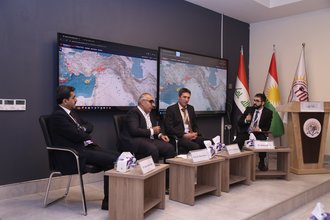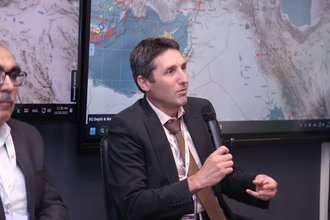Research Stay »Multiscale Consequence Studies for Hazard Impact on Structures in Iraq«
In part of the DAAD funded research project, Jun.-Prof. Lars Abrahamczyk, M.Sc. Peshawa L. Hasan, and M.Sc. Baban Bapir went for a research stay from 15 October to 15 November 2023. The project is implemented in close collaboration with the Tishk International University (TIU) under the "German-Iraqi University Partnerships" program.
The research stay started with the inauguration of the Kurdistan Educational Seismic Observatory (KESO) on 26 October 2023. The observatory is a key development and is expected to play a crucial role in collecting seismic data with the goal of enhancing the resilience of structures and infrastructures in the region against natural hazards. The event was attended by key stakeholders including government officials, industrial companies, researchers, and students.
In addition, the team from Bauhaus-University Weimar successfully implemented a pilot course to integrate international standards and practices within the existing curriculum of B.Sc. Civil Engineering at TIU. The academic exchange is a part of the project’s objective towards bridging knowledge gaps and fostering global educational standards.
The research stay also featured meetings with key government officials, local stakeholders, industrialists, and researchers to discuss potential future collaborations and future research projects. The interactions aimed towards fostering new partnerships and pathways for knowledge transfer, emphasizing the project's commitment towards long-term infrastructural resilience.
The project team conducted a series of field surveys to gather additional building stock information and geotechnical/soil investigation data. This data will be instrumental in studying the impact of natural disasters on existing structures and devising robust solutions to mitigate risks and enhance current construction practices.
The research stay strengthened the collaborative bonds between BUW and TIU while also establishing new partnerships in the region. With widespread media coverage and active engagement from the academic and industrial sectors, this research stay showcases the effectiveness of international cooperation in academia and beyond. The anticipated outcomes will influence the future of construction practices and strategies for hazard mitigation, ultimately contributing to safer and more resilient communities in Iraq.
Further News
- https://www.facebook.com/share/v/2DiTooPwxYwGXTyu/?mibextid=jmPrMh
- https://youtu.be/IDgEaNJNpoc?si=t4k5CmGZTfAEZxTn
- https://www.facebook.com/XelkNews/videos/1042335446772824/?mibextid=2Rb1fB
- https://www.facebook.com/share/v/QDhYCfjNcf6mMJgu/?mibextid=jmPrMh
- https://www.facebook.com/share/v/7ZDAM2f4MSaAd3TS/?mibextid=qi2Omg
- https://www.facebook.com/100064666932791/posts/737369415095283/?app=fbl
- https://www.facebook.com/share/v/2DiTooPwxYwGXTyu/?mibextid=jmPrMh








